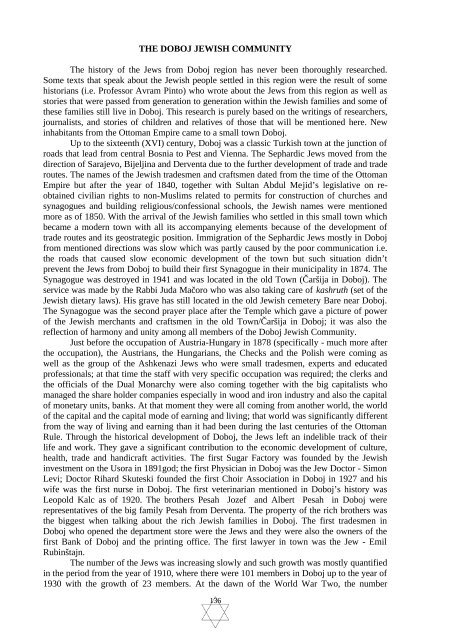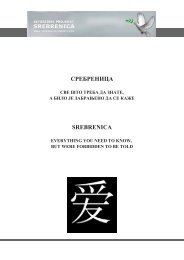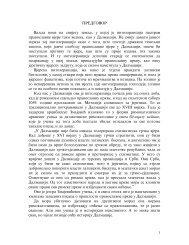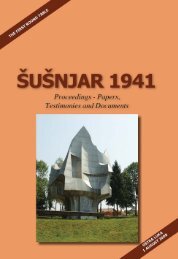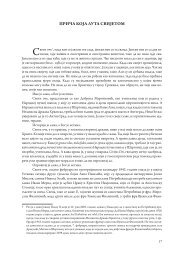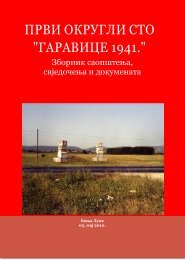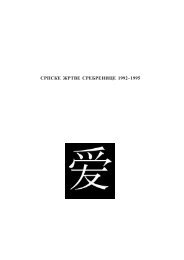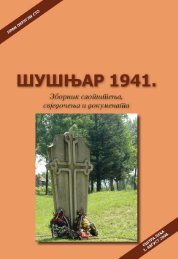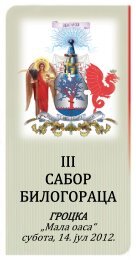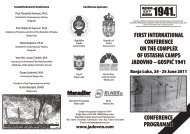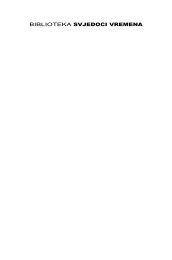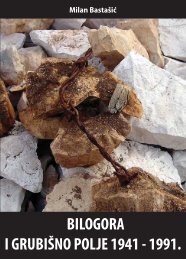- Page 1 and 2:
Dr. Jakov Danon Verica M. Stošić
- Page 3 and 4:
We will do our best that opened pro
- Page 5 and 6:
The following holiday is Šavuot-we
- Page 7 and 8:
The Jews were living in Babylon (Ir
- Page 9 and 10:
heptagonal candlestick), which was
- Page 11 and 12:
gradually came to recovery and retu
- Page 13 and 14:
in Kordoba in 915), was appointed t
- Page 15 and 16:
to Catolicism by force (marani; bap
- Page 17 and 18:
with that, definitely, according to
- Page 19 and 20:
direction of Venice, and from the d
- Page 21 and 22:
limited: The Jews and Christians we
- Page 23 and 24:
THE JEWS OF BOSNIA AND HERZEGOVINA
- Page 25 and 26:
According to the results of urbaniz
- Page 27 and 28:
In Bosnia, by the decision of the T
- Page 29 and 30:
Mostar 35 98 164 254 +219; +625,70
- Page 31 and 32:
counting from the age of second tem
- Page 33 and 34:
HOLOCAUST OF THE THE JEWS OF BOSANS
- Page 35 and 36:
Well, they would say that it has to
- Page 37 and 38:
lock, by no means must not be a res
- Page 39 and 40:
he unavoidably undertakes, he humil
- Page 41 and 42:
started the same way, by the crucif
- Page 43 and 44:
Semitism is the only and real answe
- Page 45 and 46:
at the time of Cruciades, there was
- Page 47 and 48:
succeeding to reach salvation terri
- Page 49 and 50:
THE DESTINY OF JEWISH COMMUNITIES O
- Page 51 and 52:
The families Poljokan and Levi are
- Page 53 and 54:
4. Kalmi Altarac, money changer 5.
- Page 55 and 56:
which was about to be truely perfor
- Page 57 and 58:
Proclamation of the agents of Jewis
- Page 59 and 60:
The order of Ustashas management in
- Page 61 and 62:
The decision of the Management for
- Page 63 and 64:
Original list of the arrested Jews,
- Page 65 and 66:
Original list of arrested Jews (chi
- Page 67 and 68:
and the whole world, who were askin
- Page 69 and 70:
Jasenovac criminals Ljubo Miloš i
- Page 71 and 72:
work on the businesses of the lifti
- Page 73 and 74:
A special knive for slaughtering, f
- Page 75 and 76:
egularly liquidatwd before the comi
- Page 77 and 78:
''Somehow the news on the terrifyin
- Page 79 and 80:
The concentration camp V - ''Kula''
- Page 81 and 82:
exclusively population of the surro
- Page 83 and 84:
areas, under the cheer of brotherho
- Page 85 and 86: Bosnian brigade and many others. He
- Page 87 and 88: collecting of ''the red aid'' in Ba
- Page 89 and 90: number of Banja Luka's Jews, in the
- Page 91 and 92: The changes of ownership in deed re
- Page 93 and 94: The Decision on excavation of the o
- Page 95 and 96: probably founded between 1903 and 1
- Page 97 and 98: the silver candlesticks were taken
- Page 99 and 100: NLA at the end of 1942. After the w
- Page 101 and 102: Baruh Dr. David, a dentist. He came
- Page 103 and 104: The family Levi Mošo Hajim, aged 5
- Page 105 and 106: JEWISH COMMUNITY OF SANSKI MOST San
- Page 107 and 108: The family Papić, a craftsmen, Isa
- Page 109 and 110: was about to be taken over by the I
- Page 111 and 112: 1939. Albert was killed on Šušnja
- Page 113 and 114: Kabiljo Sado, a tradesman, was a me
- Page 115 and 116: only. In accordance with that it ca
- Page 117 and 118: THE DERVENTA JEWISH COMMUNITY Spora
- Page 119 and 120: were marking traditional celebratio
- Page 121 and 122: task without precedent, committed t
- Page 123 and 124: Family of Izidor Levi, tradesman fr
- Page 125 and 126: Pesah Levij Jozef-Juso, the leather
- Page 127 and 128: liberated territory on March 15, 19
- Page 129 and 130: THE BROD NA SAVI JEWISH COMMUNITY T
- Page 131 and 132: In the second half of XIX century t
- Page 133 and 134: On August 16, 1946 the District Cou
- Page 135: 1900 22) Grihunt Hermina born in 18
- Page 139 and 140: arrests occurred as well as taking
- Page 141 and 142: Today, the Doboj Municipality is a
- Page 143 and 144: MEMOARS ON HOLOCAUST OF THE JEWS FR
- Page 145 and 146: Registered in the Book of Citizensh
- Page 147 and 148: ALBAHARI Luna (Kladanj, 1833 175 -
- Page 149 and 150: On February 4, 1930, he was reprima
- Page 151 and 152: ALKALAJ 207 Zadik M. - Bosnian Jew,
- Page 153 and 154: ALMOSLINO Moritz (Ruma, 1855 - ?) -
- Page 155 and 156: She lived with her parents in Mili
- Page 157 and 158: In the Probate Proceeding of the Di
- Page 159 and 160: Ustashe Police in Banjaluka. Togeth
- Page 161 and 162: destroyed in bombing). The total es
- Page 163 and 164: In 1942 he resided in Petra Svači
- Page 165 and 166: In the Report on deprivation of the
- Page 167 and 168: Blanka (Jajce, 13.8.1911 - ?) - Dau
- Page 169 and 170: In the Public Primary School in Bos
- Page 171 and 172: - Son of the late Jozef and the lat
- Page 173 and 174: In academic 1929/30 year resided at
- Page 175 and 176: Office the Grand Župan states: The
- Page 177 and 178: Leon M. The County Court in Travnik
- Page 179 and 180: Natan (Bijeljina, 1906 - ?) - Son o
- Page 181 and 182: In the Report as of July 14 th 1934
- Page 183 and 184: Haim (Sanski Most 6.1.1911 - ?) - S
- Page 185 and 186: BARUH 470 When in1863 Salomon Poljo
- Page 187 and 188:
In 1927/28 he continued education i
- Page 189 and 190:
As of 1950 she attended the Girl’
- Page 191 and 192:
- Tradesman from Derventa permanent
- Page 193 and 194:
He took an oath of loyalty to the I
- Page 195 and 196:
BERG Josif (Deti, Romania 15.10.191
- Page 197 and 198:
BERGMAN 537 Berta Dr (Blažuj, Sara
- Page 199 and 200:
BERNSTEIN Simon (Veliškovci, Slavo
- Page 201 and 202:
BRAMMER Moritz - Hungarian Jew, gra
- Page 203 and 204:
Upon Request of Hans Bramer from Ba
- Page 205 and 206:
BRÜCKNER Bernath - The Hungarian J
- Page 207 and 208:
CHOMET Mavro - The Official, the Ve
- Page 209 and 210:
DANON Zadik - Founded and registere
- Page 211 and 212:
Eduard - Edo Dr (Zagreb, 26.11.1895
- Page 213 and 214:
DEZSÖ Gizela maiden Berger (Szarva
- Page 215 and 216:
EISENBERG Salomon (? - 2.2.1918) -
- Page 217 and 218:
ELIJAU 626 Abraham (1865 - Banjaluk
- Page 219 and 220:
Isidor (1913 - ?) - son of Jakov an
- Page 221 and 222:
ENGEL Moritz - Came from Slavonia.
- Page 223 and 224:
ERLICH Šimon (Černovice, Romania,
- Page 225 and 226:
FAL Vera (Celovec, January 10th 192
- Page 227 and 228:
FEIN Ema (Tuzla, 1891 - ?) - The Se
- Page 229 and 230:
FERAGO Kata maiden Radaković House
- Page 231 and 232:
VI C. In the Report of the District
- Page 233 and 234:
FINKLSTEIN Mihajlo - Jew, member of
- Page 235 and 236:
FISCHER Arnold (Čakovec, 25.12.185
- Page 237 and 238:
Paul Fischer was proposed a cut tax
- Page 239 and 240:
eal estate - a ground floor and a y
- Page 241 and 242:
oom in a building located in Braće
- Page 243 and 244:
FRANCKFUTTER Moritz Dr He was a rel
- Page 245 and 246:
FRIEDLENDER Oskar (Virovitica, 1895
- Page 247 and 248:
In the reported war damage submitte
- Page 249 and 250:
Ema Ema Friedmann, clerk in the Vel
- Page 251 and 252:
FÜRST Frieda (Banjaluka, 16.2.1891
- Page 253 and 254:
GAON Avram - Professor of Gymnasium
- Page 255 and 256:
GINSBERGER Oskar Dr (Gradište, Žu
- Page 257 and 258:
GOLDBERGER Julio (Bosanski Brod, 13
- Page 259 and 260:
GOTTLIÈB Moritz alias Mavro (Kuty,
- Page 261 and 262:
On June 15th 1928 she got married w
- Page 263 and 264:
GROSS Hermann - Jew from Slavonia r
- Page 265 and 266:
the Head of District in Derventa. I
- Page 267 and 268:
He took an oath to NDH on November
- Page 269 and 270:
Prozor attacked partisans on August
- Page 271 and 272:
Project and civil engineering work
- Page 273 and 274:
GÜNSBERGER David - Oskar Dr (Gradi
- Page 275 and 276:
HAJON Irena, maiden Levi According
- Page 277 and 278:
HALPERN Pinkas (1878 - ?) - Salesma
- Page 279 and 280:
According the data from Web site ww
- Page 281 and 282:
By the memo of the Ustashe Headquar
- Page 283 and 284:
- Son of dentist Žiga Dr Herzog an
- Page 285 and 286:
the war was declared by great power
- Page 287 and 288:
HERZMAN 990 Eduard (Klagenfurt, 186
- Page 289 and 290:
HOFMAN 1008 Arnold (Hruševac, Veli
- Page 291 and 292:
Bukica, maiden Nachmias (Banjaluka
- Page 293 and 294:
From September 27 th 1934 worked as
- Page 295 and 296:
- Forester (lower) VIII position gr
- Page 297 and 298:
In the petition for citizenship, wh
- Page 299 and 300:
Viktor Gutić was not kidnapped as
- Page 301 and 302:
She attended and completed the Juni
- Page 303 and 304:
KAFF Albert (Banjaluka, 1892 - ?) I
- Page 305 and 306:
KASTL Moritz On November 6th 1866 h
- Page 307 and 308:
KAUFER Leopold Dr (Virje, Koprivnic
- Page 309 and 310:
tailoring and sewing of underwear f
- Page 311 and 312:
Together with other Bihać Jews she
- Page 313 and 314:
KOCH Paul According to the report o
- Page 315 and 316:
KOHN Leopold - A Jew from Slavonia,
- Page 317 and 318:
To July 28th 1942 she had permanent
- Page 319 and 320:
KONFORTI Jakob Dr, called Jako (Mos
- Page 321 and 322:
KRAUSZ Margita-Marija (Bač, Sombor
- Page 323 and 324:
KRONFELD Rihard Eng. (Zagreb, 4.2.1
- Page 325 and 326:
KUH Rozalija - Jewess from Croatia.
- Page 327 and 328:
authorities in the concentration ca
- Page 329 and 330:
LAUFFER 1255 Josip-Josef Dr (Krakow
- Page 331 and 332:
LEVI 1275 Menta He lived in Banjalu
- Page 333 and 334:
2602/47 of April 1st 1947, and at a
- Page 335 and 336:
dealer and travels for treatment an
- Page 337 and 338:
He was in a group of 31 Jews and 8
- Page 339 and 340:
From 1910 to 1914 she attended the
- Page 341 and 342:
District Court, Number O:317/47, it
- Page 343 and 344:
Luna (Banjaluka 15.5.1914 - ?) - Da
- Page 345 and 346:
- The Housewife; wife of Salomon Le
- Page 347 and 348:
He was in a group of 31 Jews and 8
- Page 349 and 350:
In the period from 1934 to 1937, sh
- Page 351 and 352:
- The Watchmaker. On January 10, 19
- Page 353 and 354:
Majer (Banjaluka 1921 - ?) - The Wo
- Page 355 and 356:
LICHTENSTEIN Efraim Franz (Budapest
- Page 357 and 358:
signed by the Head of the Ustashe P
- Page 359 and 360:
MAESTRO Juda (Bihać, 1876 - ?) - T
- Page 361 and 362:
MALAMED Jakov (Herson, Russia, 1883
- Page 363 and 364:
MARIĆ Hinko Dr (Varaždin, 18.1.18
- Page 365 and 366:
MEVORAH 1549 Jakob-Jakov On May 30t
- Page 367 and 368:
Jozef Mevorah presided the first me
- Page 369 and 370:
MONTIJAS Haim-Hajm-Hajmo (Banjaluka
- Page 371 and 372:
According to the Statement of the P
- Page 373 and 374:
From November 17, 1934 to November
- Page 375 and 376:
Sadik (about the year 1923 - Užice
- Page 377 and 378:
MOSKOVITZ Lili (Prijedor 23.4.1905
- Page 379 and 380:
NACHMIAS 1659 Samuel - The son of J
- Page 381 and 382:
"Jozef Nahmijas, of the late Samuel
- Page 383 and 384:
In the Report on War Damage, which
- Page 385 and 386:
Banjaluka. The ground floor of the
- Page 387 and 388:
y the State. In the house was Works
- Page 389 and 390:
In the Request sent in 1955 to the
- Page 391 and 392:
29, 1941 and the List was signed by
- Page 393 and 394:
Pursuant to the Decision of the Sup
- Page 395 and 396:
a two-stage building with a three-r
- Page 397 and 398:
NEUBACH 1799 Hugo (Bosanska Gradiš
- Page 399 and 400:
NEŬFELD Alfred 1810 Dr (Rzeszowu,
- Page 401 and 402:
NEUMANN 1816 Jakob On September 23,
- Page 403 and 404:
ORNSTEIN 1832 Eta, maiden Fröhlich
- Page 405 and 406:
Isak PAPO-PAPIĆ 1843 He resided in
- Page 407 and 408:
and shall be submitted to the Court
- Page 409 and 410:
Samuel Papo, son of Jozef, born in
- Page 411 and 412:
Because of illegal travel, Samuel a
- Page 413 and 414:
The following members of the Papo f
- Page 415 and 416:
Jozef Pesah, son of Levi, born in 1
- Page 417 and 418:
On September 2, 1925 she submitted
- Page 419 and 420:
PINCHASS 1976 Flora, widow, Klemm (
- Page 421 and 422:
David Dr (Sarajevo, 25.9.1897 - ?)
- Page 423 and 424:
PODVINETZ Srećko-Feliks Dr (Osijek
- Page 425 and 426:
Since the Turks, he carried a weapo
- Page 427 and 428:
He was a subject of hearing two tim
- Page 429 and 430:
"medium height, round face, greyish
- Page 431 and 432:
On April 17, 1926 the Association P
- Page 433 and 434:
23. 2094 Up to July 28, 1942 she ha
- Page 435 and 436:
In the Application the deprivation
- Page 437 and 438:
Salomon, alias Moni A. (Banjaluka,
- Page 439 and 440:
was transferred to the District Cou
- Page 441 and 442:
arrested and was confined by the It
- Page 443 and 444:
QUITTNER Maks - The Hungarian Jew,
- Page 445 and 446:
REICHBACH Adela (Rudo, 16.5.1914 -
- Page 447 and 448:
RAUSNITZ Jolana-Jolanka Dr (Gradina
- Page 449 and 450:
REDLICH Margareta (Sarajevo, 1905 -
- Page 451 and 452:
Banjaluka that on August 7 th were
- Page 453 and 454:
RIEMER 2206 Dragutin-Karlo (Hogore
- Page 455 and 456:
ROMAN Samuel Dr Upon the Decision o
- Page 457 and 458:
Sarina, maiden Levi (1899 - the Jas
- Page 459 and 460:
An internship in the Clinic for Gyn
- Page 461 and 462:
ROTH Paula (Bohemia, 28.2.1887 -?)
- Page 463 and 464:
Gizela-Ludmila married Kohn, remarr
- Page 465 and 466:
Maks In the period from 1931 to 193
- Page 467 and 468:
According to the War Damage Report
- Page 469 and 470:
ROSNER Isidor (Dorna Vatra, Bukovin
- Page 471 and 472:
SALOM 2322 He was the first Jewish
- Page 473 and 474:
The Župa Police - area of Banja Lu
- Page 475 and 476:
Flora (Banjaluka, 30.10.1926 - ?) -
- Page 477 and 478:
On July 6th 1921 she submitted to t
- Page 479 and 480:
in Banjaluka, Jewish Nationality, a
- Page 481 and 482:
in 1878 in Banjaluka and mother Saf
- Page 483 and 484:
SALZBERGER Jeanetta (Banjaluka, 5.2
- Page 485 and 486:
Letter), "Tragom života" (Followin
- Page 487 and 488:
SCHIFFER Moses Dr (Sučava, Bukovin
- Page 489 and 490:
SCHMUCKLER Vilim Dr (Odesa, 5.10.18
- Page 491 and 492:
- The wife of landowner Ludwig Schm
- Page 493 and 494:
Miroslav (Zagreb, 1938 - ?) - Son o
- Page 495 and 496:
SCHÖNWALD Slavko (Karlovac, 1867 -
- Page 497 and 498:
SCHÜTZERS Elizabeta (Munkačevo, C
- Page 499 and 500:
SILBERBACH Flora (Sarajevo, 5.10.18
- Page 501 and 502:
SONNENSCHEIN 2520 Max - On June 20,
- Page 503 and 504:
SPITZ 2528 Isidor - The Hungarian J
- Page 505 and 506:
SPITZSTEIN 2536 Bernhard (1864 - ?)
- Page 507 and 508:
STEINER Moric the Engineer - The Ci
- Page 509 and 510:
He was among 14 arrested Jews who w
- Page 511 and 512:
abovementioned from the beginning o
- Page 513 and 514:
On July 1, 1941 pursuant to the Dec
- Page 515 and 516:
By the Decision of the Mobile Court
- Page 517 and 518:
1.546/43 related to the families in
- Page 519 and 520:
STOCKHAMMER 2626 Josip (Žalkef, Po
- Page 521 and 522:
Boro Ilić, Josip Rolih, Nikica Pav
- Page 523 and 524:
SZÖLLÖS 2647 Mavro-Marko Dr (Tren
- Page 525 and 526:
TEMPEL Ignatz Dr (Pabjanica, Poland
- Page 527 and 528:
TRINKI Albert (Zenica, 1912 - Zagre
- Page 529 and 530:
TUCH 2674 Majer (1864 - ?) - Austri
- Page 531 and 532:
VINSKI Blanka (1893 - the concentra
- Page 533 and 534:
VÖGEL 2682 Moric (Banjaluka, 1910
- Page 535 and 536:
WEINBERGER Draga-Dragica Dr (Sesvet
- Page 537 and 538:
In the World War One, he was a volu
- Page 539 and 540:
lived on the first floor of the hou
- Page 541 and 542:
WINTER Frederik-Miroslav Dr (Saraje
- Page 543 and 544:
ZELIKOVIĆ Samuel (Czechoslovakia,
- Page 545 and 546:
BORIJENOVIĆ MIRKO, Eyewitness, Pod
- Page 547 and 548:
BOŠNJAK BRACO, Memories, Gradiška
- Page 549 and 550:
BASTAŠIĆ MILAN, Eyewitness, Grubi
- Page 551 and 552:
Branko was killed in Virovitica. Đ
- Page 553 and 554:
you to pass through the concentrati
- Page 555 and 556:
concentration camp in Uštice. This
- Page 557 and 558:
In the meantime my father was trans
- Page 559 and 560:
PETKOVIĆ BOGDAN, Eyewitness, Banja
- Page 561 and 562:
DELIĆ ZORKA - SKIBA, Eyewitness -
- Page 563 and 564:
not to come back to the camp but to
- Page 565 and 566:
MILAN COHEN, Eyewitness - Israel Th
- Page 567 and 568:
grandfather worked "hard" to provid
- Page 569 and 570:
SOURCES AND BIBLIOGRAPHY DOCUMENTS:
- Page 571 and 572:
29. Simić Zoran Simara, Banja Luka
- Page 573 and 574:
30. Jaša Romano, the Jews from Yug
- Page 575 and 576:
MEMOARS ON HOLOCAUST OF THE JEWS FR
- Page 577 and 578:
Preface I PART CONTENTS SHORT REVIE


